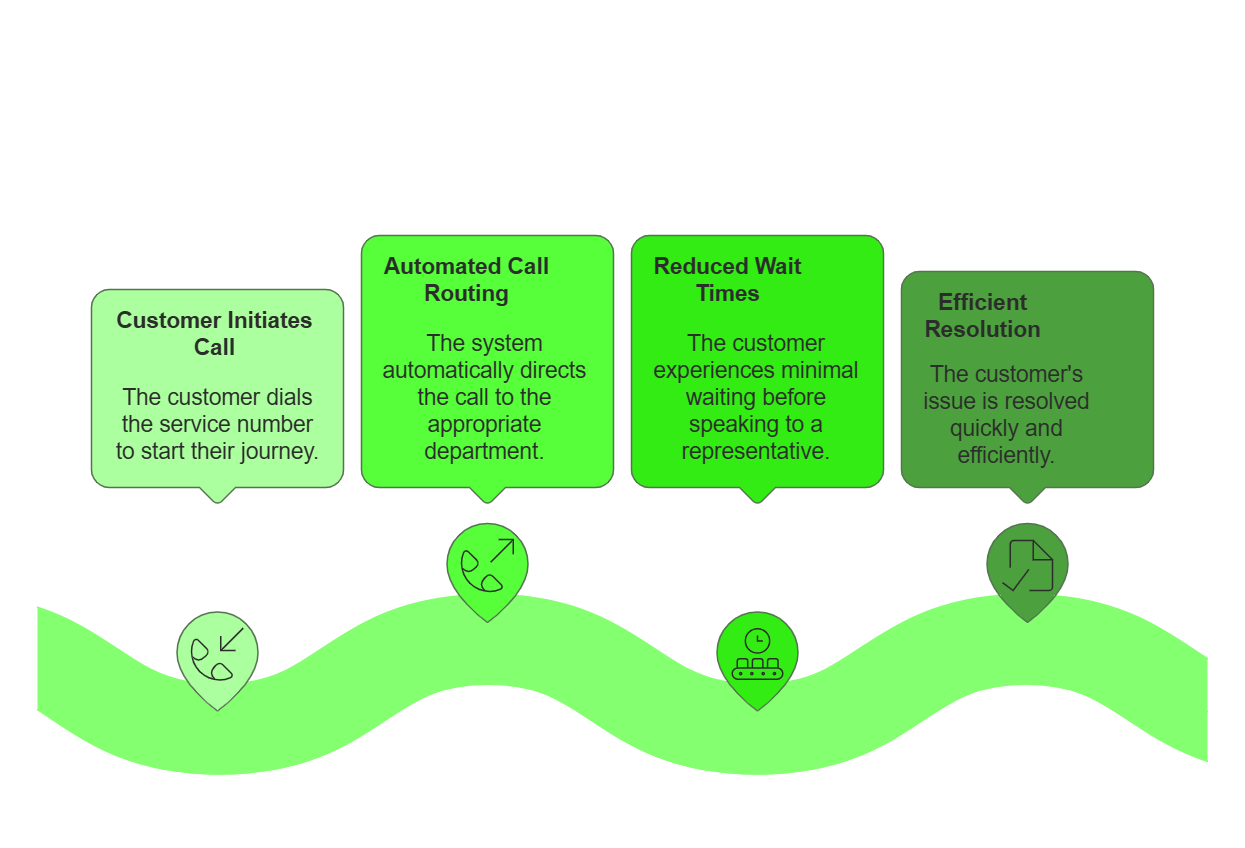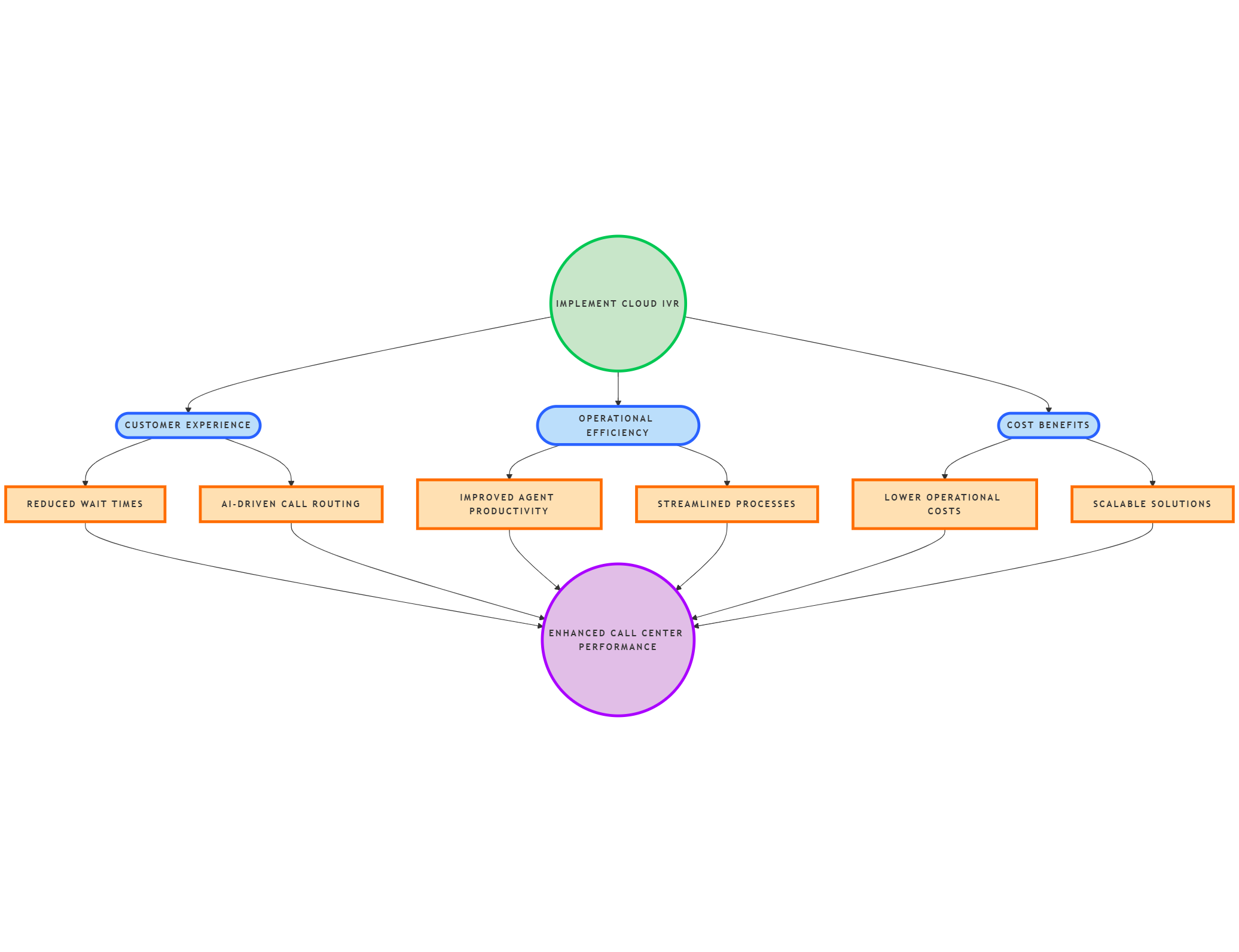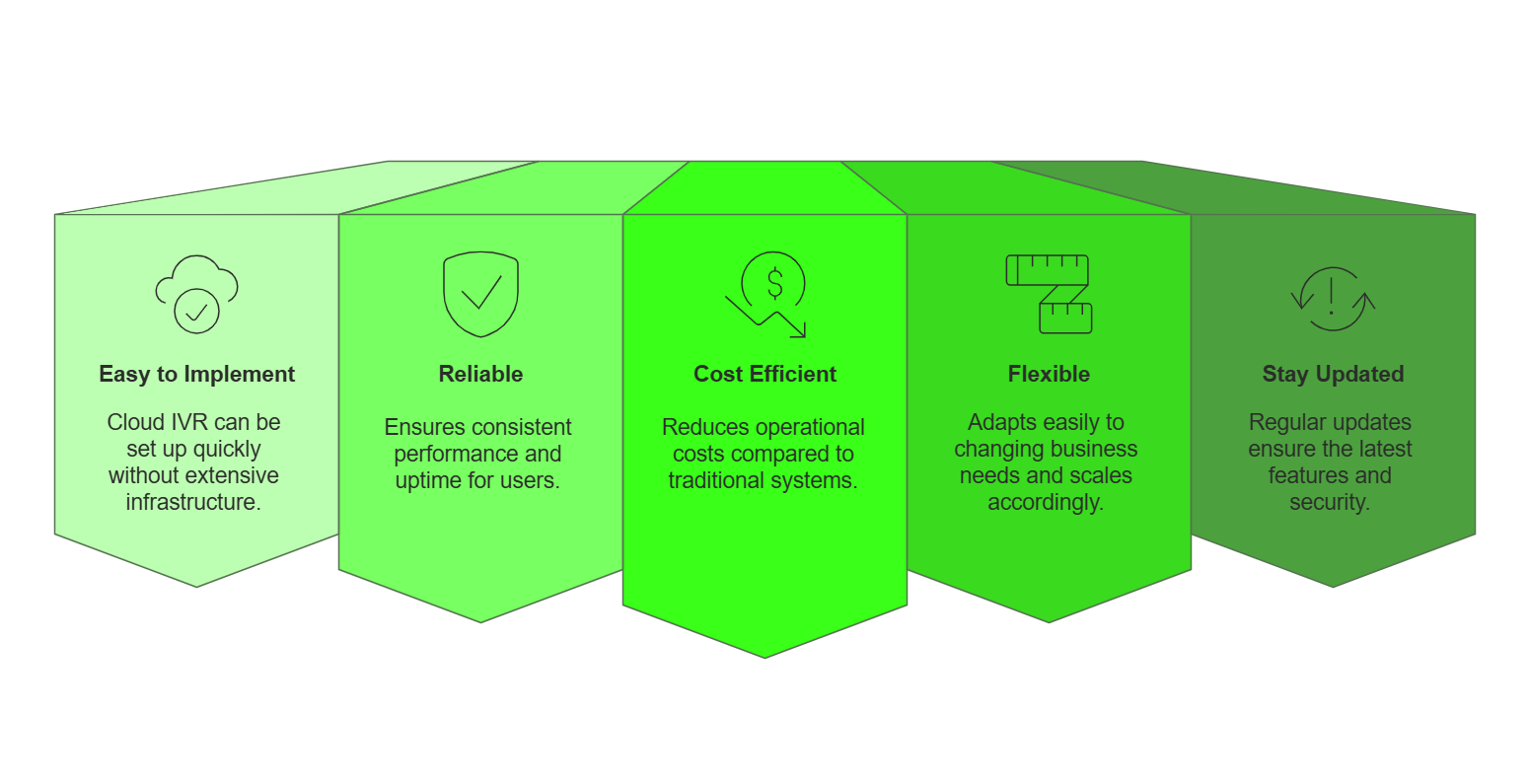Cloud Interactive Voice Response (IVR) systems have transformed the way call centers function, offering advanced features, seamless integration, and significantly improved customer experiences. As we step into 2025, the adoption of cloud-based IVR continues to rise, driven by its scalability, cost-efficiency, and ability to cater to the evolving expectations of modern customers. This shift reflects a growing need for flexible and responsive communication systems in an increasingly digital business landscape.
Interactive Voice Response has evolved beyond traditional models into a cloud-powered, AI-enhanced solution that streamlines call center operations. With automation at its core, Cloud IVR enables faster, more personalized customer interactions while reducing manual workload for agents. Businesses embracing this technology are seeing improvements in efficiency, responsiveness, and customer satisfaction key factors in staying competitive in a fast-paced, customer-centric world.
Here are some untold facts and insights about Cloud IVR systems and why your call center should adopt one.
What Are the Hidden Advantages of Using Cloud IVR in Call Centers?
Cloud IVR offers more than just call routing it enables remote setup, real-time analytics, multilingual support, and seamless integration with CRMs. Platforms like FreJun deliver intelligent Cloud IVR solutions that improve customer satisfaction, reduce operational costs, and scale effortlessly as your business grows.
What is a Cloud IVR System?
A Cloud IVR system is an automated telephony solution hosted on the cloud that interacts with callers, gathers information, and routes calls to the appropriate agent or department. Unlike traditional IVR systems, cloud-based solutions require no on-premise hardware and can be managed remotely through a web-based interface.
Customer Journey with Cloud IVR

Cloud IVR’s Lesser-Known Functionalities
| Feature | How It Benefits Call Centers |
| Predictive Call Routing | AI detects caller intent and assigns the best agent. |
| Natural Language Processing (NLP) | Understands speech better for smoother interactions. |
| Multi-Language Support | Can handle diverse customer bases automatically. |
| Smart Call Deflection | Redirects customers to self-service or chatbots when needed. |
Enhance Call Center using Cloud IVR

How Does a Cloud IVR Work?
A cloud IVR is quite similar to your regular IVR. The only difference is it operates entirely within the cloud. In other words, companies need not create, own, or manage the infrastructure, applications, or data centers required to operate the cloud IVR. Instead, the solution provider completely handles the infrastructure that hosts the IVR platform.
As a business, all you are doing is renting a space in that infrastructure by paying a subscription fee every month. You can access and operate all the IVR tools in that ecosystem through the Internet.
Learn more on Sales Tools to Help Boost your Sales
Benefits of a Cloud IVR

Here are some of the compelling reasons why you must adopt a cloud IVR for your business –
1. Easy to Implement
From the definition, you would have understood that a cloud IVR doesn’t need any on-site hardware to be installed at your location. This means you can implement the cloud IVR system in your business with a few clicks and start using it immediately. No need to wait for technicians to arrive at your place and set up complex servers and software anymore.
2. Reliable
Despite some variance from one business to another, it is quite safe to say that cloud IVRs are extremely reliable. Some providers even promise 99.99% uptime SLA, which means you relax knowing that exemplary IVR service is available 24X7 for all your callers. This also significantly reduces the chances of missing a call, another major factor resulting in poor customer experience.
3. Cost Efficient
This might not come as a surprise for you again as cloud IVR eliminates complex hardware and software setups, thus saving you huge costs. But this is just the tip of the iceberg. There are many other cost-saving avenues when you adopt cloud IVR for your business. For starters, you can save huge money on training your personnel as cloud IVR has a flat learning curve. Also, you do not have to worry about paying for any issues as it is taken care of by the service provider.
4. Flexible
This is probably the biggest need of a modern business owner and is well-served by a cloud IVR. After all, in this highly dynamic world, it is impossible to predict how many callers will call at a particular period of the year. There can be phases where there is a complete lull or times when there are thousands of callers every hour. You can easily scale a cloud IVR up without spending exponentially for it. This is because you do not have to pay anything to purchase additional servers to host the increasing number of callers. This is taken care of by the service provider.
5. Stay Updated
Not only the hardware but even software updates and upgrades are also handled by the service provider. In case there is a new cutting-edge feature or a security issue is resolved, it will be automatically handled by the IVR provider through the cloud. All you need to do is download the updates/upgrades when it is released for users.
Cloud IVR Best Practices
Here are some best practices that you can adopt while implementing, designing, and managing a cloud IVR solution-
1. Make Options Easy to Understand
Simplicity is the key. Nobody likes to go through a complex menu option comprising multiple options only to select the wrong one. 9 out of 10 times, the user will prefer or end up talking to the agent when they do not understand the menu options.
This will not only result in a poor user experience but also defeat the purpose of implementing a cloud IVR. You need to ensure that there aren’t more than 5 options on each menu. Also, design the options in such a way that the user can reach their destination in a single attempt.
2. Immediately Offer Callers the Option to Connect with a Real Person
We understand the goal of an IVR is to reduce the number of callers trying to reach a human agent. And most businesses don’t like to pile up the number of incoming calls to their live agents.
But that doesn’t mean you stop people from doing that. It just portrays you in a negative light as they will feel that they have been trapped in jail. That’s why we recommend adding an option to connect with the agent at any stage of the caller’s journey. This will help you earn their trust in no time and do a world of good for your business in the long run.
3. Ensure that the IVR Voice is Clear
You must ensure the voice you use for your IVR doesn’t sound robotic. It is proven time and again that people enjoy interaction with another person not only by the words the other person uses but also by their tone of voice. You must ensure that the voice sounds as realistic as possible to a live agent. This will give the caller more confidence to interact further with the IVR.
4. Enable Customer Callback
This is particularly important for those businesses that do not have a lot of live agents in their call centers. Offering a callback option is the easiest way to ensure that all your customers’ calls are answered without putting too much pressure on your small workforce. This is nothing but a win-win situation for both. Some cloud IVRs introduce the callback option smartly if the call hold time exceeds a particular time limit.
5. Provide Regular Updates on Their Estimated Wait Time
This is mainly applicable if your caller has decided to talk to a live agent for a solution. In that case, you must ensure that your caller is not in the dark about the estimated time he/she has to wait to finally connect with the agent. The worst thing you can possibly do is to run the same elevator music repeatedly to the caller. Most modern cloud IVRs can not only notify the wait time but also inform their current position in the call queue. Implement this feature (if available) while setting up the IVR in your business.
Editor’s Choice: What is IVR?
6. Maintain and Update Your IVR Regularly
Customer requirements are constantly evolving, and so should your cloud IVR. You need to keep abreast with the latest trends and modify your IVR accordingly. Right from the voice to the menu options, it should keep changing. For example, if you no longer have a particular service in your company, that option should never come up in your IVR. Similarly, if you have recently introduced a new product in your brand, you can promote that while the callers are waiting to speak to an agent.
7. Measure the Performance of Your IVR
The key to measuring the performance of your IVR is the selection of the right metrics. You must ensure that you track KPIs like Net Promoter Score (NPS), Customer Satisfaction (CSAT), First Contact Resolution (FCR), and Average Speed of Answer (ASA) of your calls to gauge how well your IVR is performing. More importantly, you must take adequate action in case one of these numbers are low.
How Do You Set Up Your Cloud IVR?
Once you have finalized your IVR provider, you need to select your desired plan. After that, you need to sign all the necessary contracts and make the payment for your plan. Your service provider will create an account for you and your employees in their application and share the credentials with you. You will also be asked to select the desired IVR number from the list of available numbers.
The next step is to design your IVR menu. Follow all the best practices highlighted in the previous section while completing this step. Many service providers offer a simplistic user interface where you can drag and drop the menu options and save them with a single click. You will also have the option to customize the waiting music, the voice, and any special message during the caller interaction.
The last step is to save and test out the cloud IVR by putting yourself in the caller’s shoes. Do an end to end testing and eliminate all types of edge cases or potential errors that can come up during the actual customer calls.
Why Your Call Center Needs Cloud IVR in 2025
Adopting a Cloud IVR system is no longer optional for call centers aiming to remain competitive. With its ability to handle high call volumes, deliver personalized experiences, and adapt to future trends, Cloud IVR is an essential tool for any forward-thinking organization.
Conclusion
Cloud IVR systems are redefining the call center landscape in 2025. By offering unmatched flexibility, scalability, and advanced features, they empower businesses to deliver exceptional customer experiences. If you are a business with high call volumes, you may stand to benefit from a cloud IVR over the traditional IVR. You get to enjoy the unlimited scalability and cost-effectiveness offered by the cloud IVR system. But for any growing business, the first step is to adopt a cloud telephony platform due to the advanced features it offers, such as call scheduling, auto-dialer, call recording, call logging, CRM integration, etc.
FreJun is the #1 cloud telephony platform in India that offers all these features plus many more. The best part is that FreJun comes with a free 7-day trial for you to explore all the features without any restrictions.
Further Reading: Top 14 Winning Tips to Improve Your Call Center
Frequently Asked Questions
As the name indicates, a cloud-based IVR is an Interactive Voice Response system that is hosted completely on the cloud rather than on-premises. This enables it to provide a variety of benefits to its users.
Some of the popular features of a cloud-based IVR include omnichannel support, multilingual support, integrations with CRM, call recording, and call authentication.
IVR stands for Interactive Voice Responses. It is a technology that allows callers to interact with pre-recorded messages to resolve their queries instantly without the need to talk to a live agent.
Your use of IVR can be drastically improved by following the best practices highlighted in this post. For example, you must ensure that the menu options are easy to read, and you must offer the callers the ability to talk to a live agent at every stage of their call.
An IVR system costs anywhere between ₹5000 to ₹50000 per month, depending on the vendor and the number of calls you expect in a month.
It eliminates the need for expensive hardware and maintenance. FreJun offers flexible pricing plans, making it budget-friendly for businesses of all sizes.
Definitely. Cloud IVR can be accessed and managed from anywhere. FreJun ensures remote teams stay connected through cloud infrastructure.
